How to Help Children Enjoy Reading? 10 Simple Steps
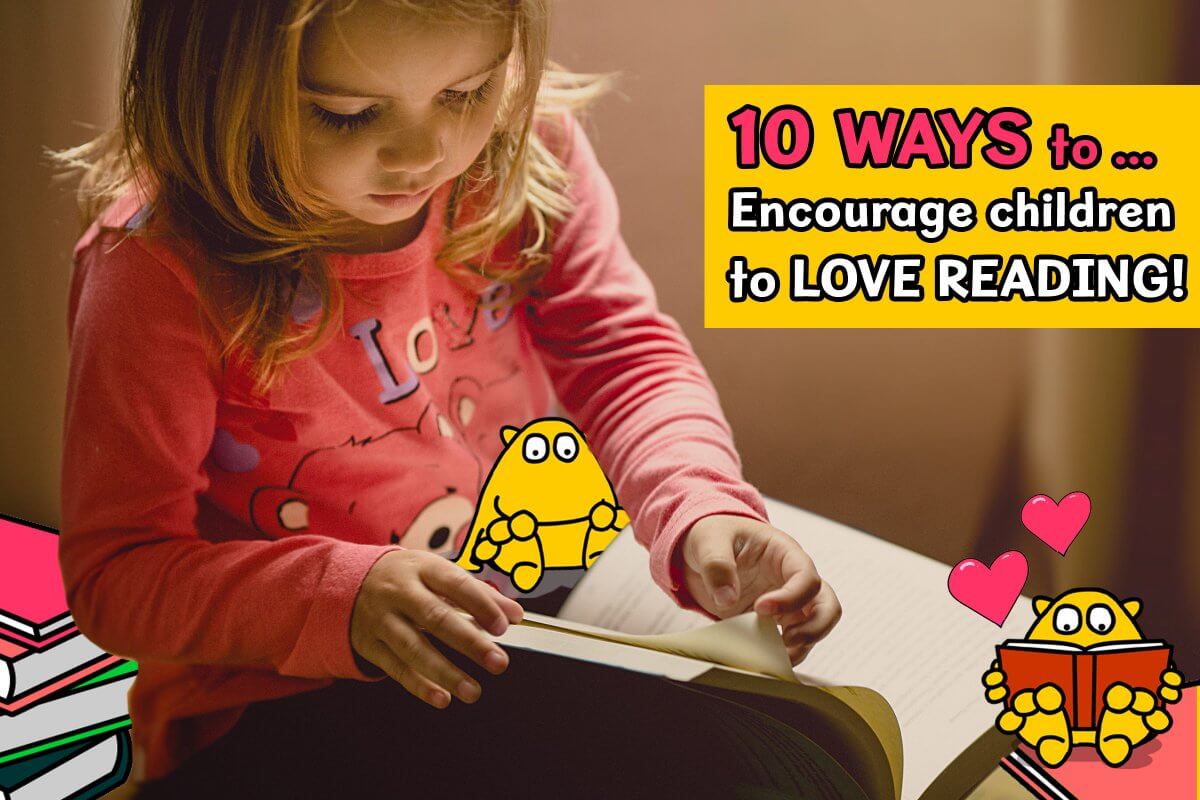
How to enjoy reading; how do we make sure our children see reading as a fun and desirable way to spend their time rather than a boring chore that they have to endure? Let’s look into how we can encourage children to love reading…
- Why is a love of reading so important?
- 10 ways to encourage children to love reading
- Love reading with Busy Things
Why is a love of reading important?
First of all, why is it important to encourage children to love reading?
Reading is a lot more than the ability to decipher a jumble of letters on a page – it gives children access to general knowledge, new perspectives on the world and expands their vocabulary.
Reading books (or any reading material) and talking about them can also help children’s confidence and wellbeing, encourage empathy and broaden their life skills.
Research suggests that reading for pleasure is also directly linked to academic attainment. The Reading Agency sights that children who read books often at age 10, and more than once a week at age 16, gain higher results in maths, vocabulary and spelling tests at age 16 than those who read less regularly.
So, we know it’s important but how can we encourage children to love reading? Here are 10 ideas to help children enjoy reading…
1. How to enjoy reading? Make it relatable!
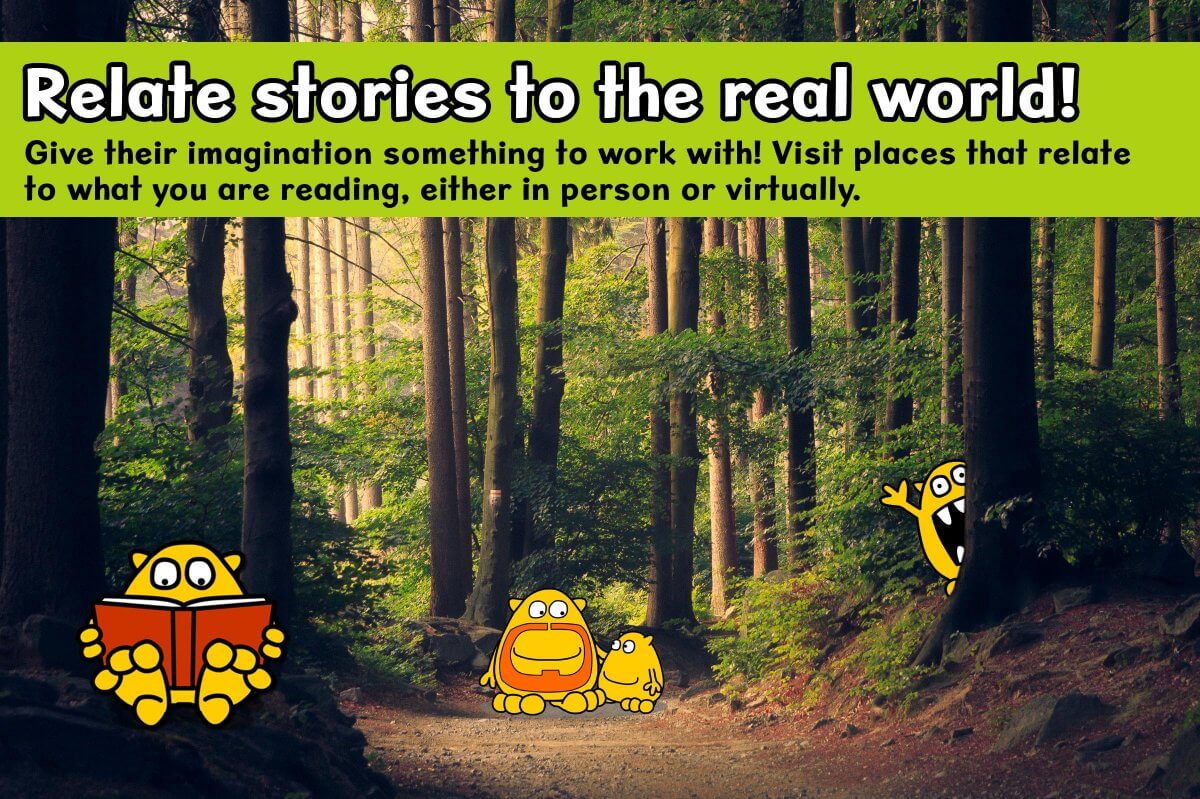
It’s hard to love reading about something that you have never seen or experienced – children have wonderful imaginations but they need something to work with. Connect a story to the real world to really bring it to life!
For example, if you have read (or are about to read) a story about a forest or a farm animal, go to visit one! Reading about an astronaut adventure? Go to a Space Centre or do some star gazing together.
Discuss the book whilst on your visit, you could even take it with you. Or when you’re reading the book at home later, talk about your visit and how it relates to the story.
If there isn’t anything relevant nearby or funds are tight, You Tube will most likely be able to help with a virtual experience such as this rainforest virtual field trip or this farm tour.
2. Tap into children’s interests to prompt a love of reading
What do they enjoy? Try some reading material that incorporates your child’s interests – a simple but effective route to get them into reading for pleasure. It doesn’t have to be a fictional story book, a factual autobiography or a magazine might peak their interest more.
What are their friends enjoying reading? Ask for recommendations from other parents and their teachers. Have a look at these book recommendations.
Visit the library or a local bookshop to let them see the huge variety that is available and allow them to choose what they think looks interesting.
3. How to really ENGAGE children in what they are reading
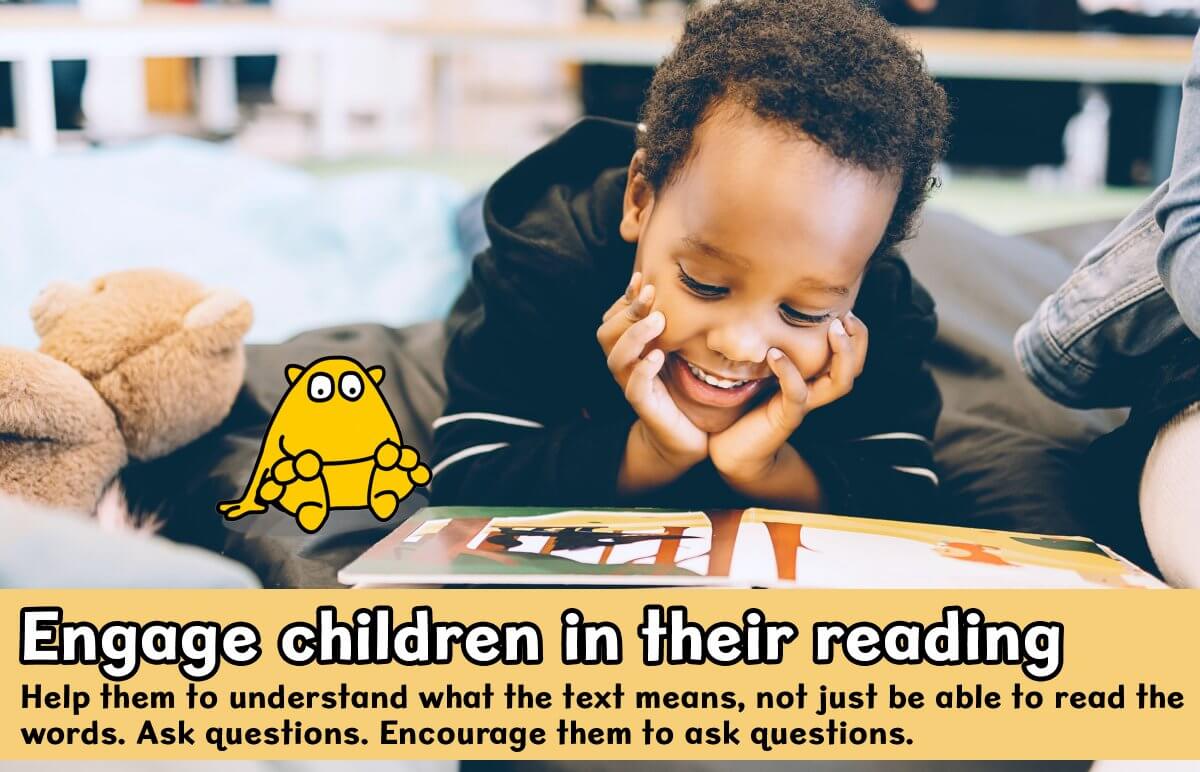
A love of reading comes from an ability to immerse yourself in a story and enjoy connecting with content – you don’t just read what the text says, you understand it and take meaning from it.
The simplest way to engage children, and improve reading comprehension, is to ask them questions and encourage them to ask you questions too. At natural stopping points – the end of a sentence/page/chapter – you could ask questions such as:
- What’s happening?
- What do you think is going to happen next?
- Why do you think Character Y did Z?
- What do you think Character A is thinking?
- Are there any words you don’t understand? What do you think this word means? Explain it.
- Have you ever done / seen / been in this situation?
- What’s your favourite bit of the book and why?
- Who is your favourite character and why?
- Do they agree with the ending of the story? How else could it have ended?
- For more ideas, have a look at these 21 Questions to Ask Your Child About a Book
Busy Things includes many popular book extracts such as from Jamia Wilson’s ‘Young, Gifted and Black’ and Cressida Cowell’s ‘How to Train Your Dragon’. Each extract is complemented by lots of reading comprehension activities to help engage children in the stories.
Pretend play is another great way to get children to engage in a story and practice empathy. Children tend to love role-playing, so next time they are playing in this way make sure to talk about things you are reading/have read – e.g. if they’re pretending to be a magician, suggest they are being Harry Potter or The Witch from Room on the Broom – ask about things that happen in the book, suggest some scenes that they might re-enact etc.
4. Don’t be too quick to correct mistakes!
Lots of stopping and starting will take the joy out of a story and can knock children’s confidence so be careful about picking up on every little mistake. Quite often a child will realise if something doesn’t make sense and go back to correct it themselves anyway.
If the mistake is something that doesn’t affect the understanding of the story, it probably doesn’t warrant breaking their reading flow. You can always go back to review words at a natural break or at the end of the book you could do a spot word game – speedily choose ‘random words’ on random pages of the book for them to read.
It’s helpful if you understand phonics so that you can help your child sound new words out – see our blog How Playing Phonics Games can Improve your Child’s Reading for more information on this.
5. How to make reading a reward
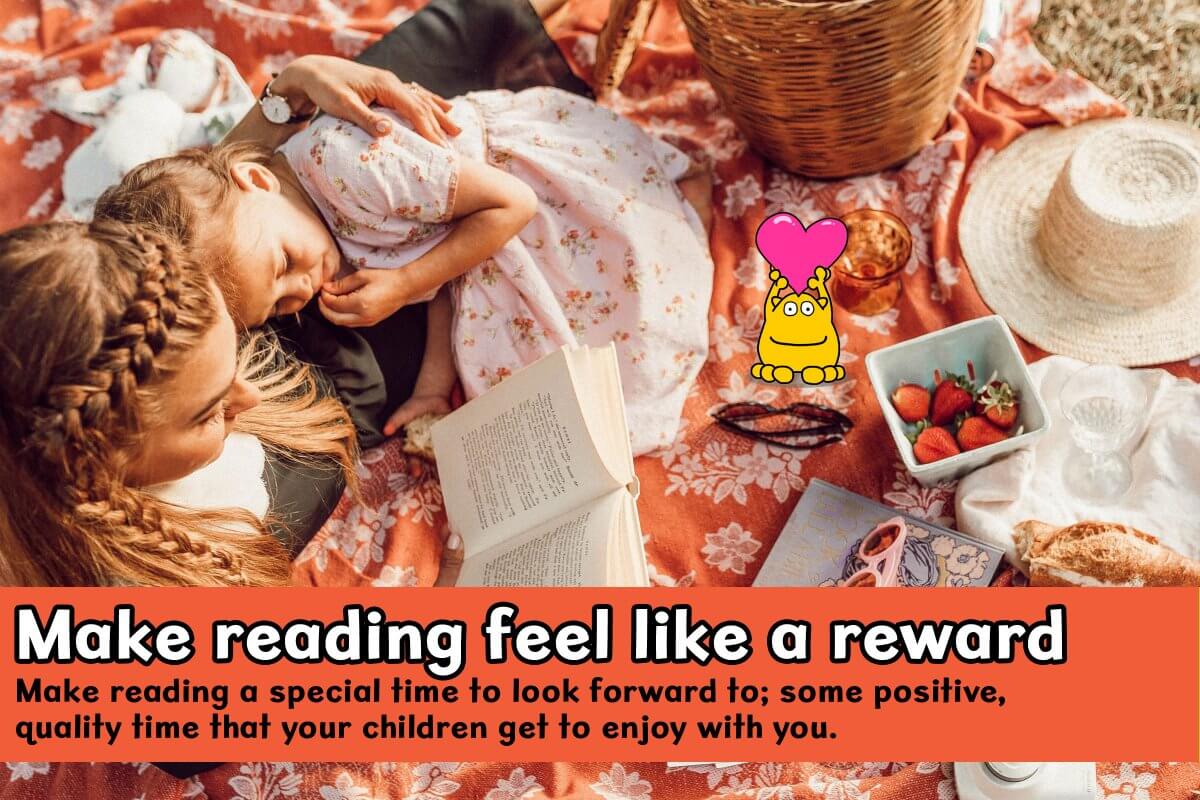
Make reading something to look forward to; some positive, quality time that your children get to enjoy with you.
Always give lots of praise for their hard work and perseverance. You could consider a reward chart for pages or whole books read. Story Time Magazine has some great reading reward ideas.
Make sure reading is seen as a positive experience and books are treats – when they’ve done something well, reward them with a new book and include a visit to the library in your go-to list of fun trips out.
Get Santa, the Tooth Fairy and the Easter Bunny in on the act too – they can all bring books as treats!
6. Ways to make reading fun!
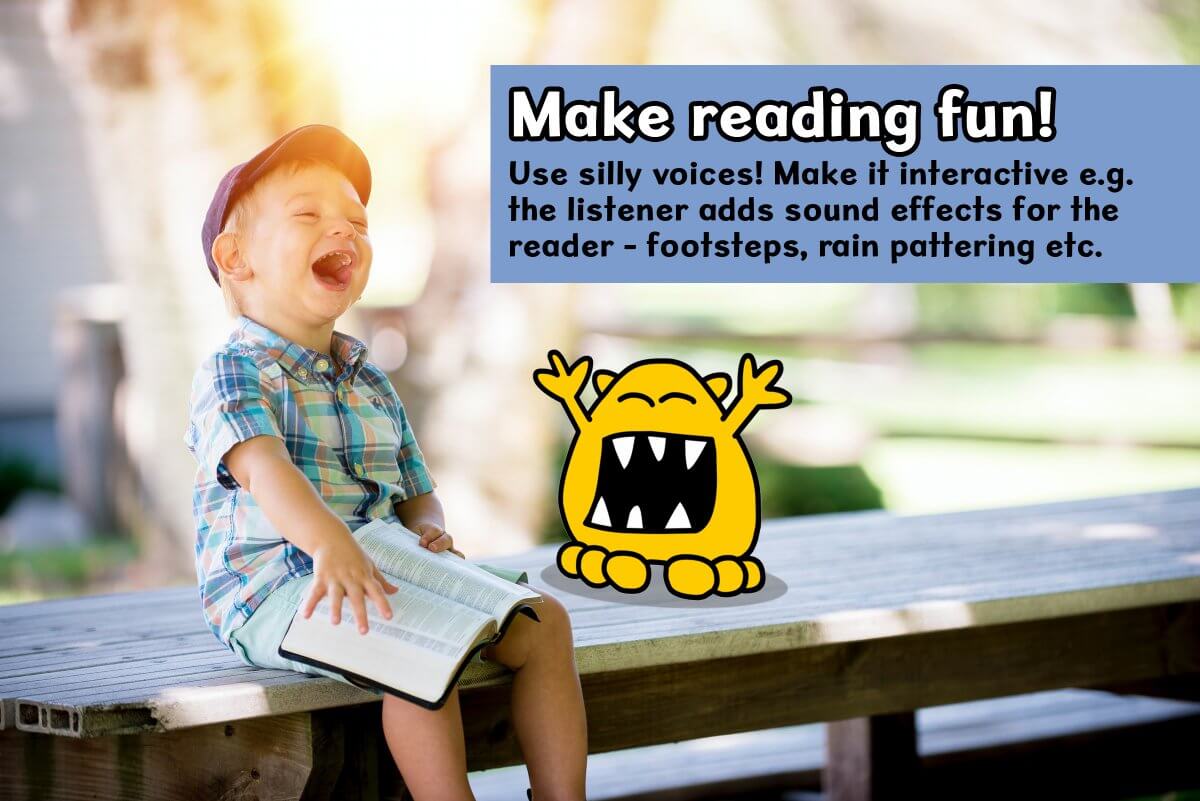
Take a little and often approach. Reading is hard work and a child’s attention span is fairly short so take your cue from them when they’ve had enough. Being forced to concentrate on something for too long will take the enjoyment right out of it.
Make reading more of an interactive experience, for instance:
- Take it in turns to read a sentence or a page.
- Can they catch you out when you replace a random word?
- It’s the listener’s job to add sound effects for the reader e.g. footsteps, closing doors.
- Do some improvisation – act out what else you think the characters might say.
Use the silly voices! Make them laugh. If they hear different tones and voices when being read to, they’ll start using intonations when reading in their head too which makes reading all the more enjoyable.
Does the book have a film equivalent? Here’s a list of children’s books with film adaptions. You could read the book then watch the film and compare the two.
Set a challenge to read X many books! As an added incentive, why not do it as a fundraising exercise.
Use fun reading games to improve their confidence in reading. Busy Things includes a vast range of very funny phonics games that you can try for free!
7. How to enjoy reading? Mix it up!
You can motivate and encourage children to love reading by offering lots of choice and different ways of connecting with reading material.
Listening to audio books will encourage their imagination – you could give them the book to follow along with.
Let them explore different genres and authors and different types of reading material; fiction, poetry, factual books, biographies, magazines and recipe books. Perhaps you’ll find some inspiration here: Time’s 100 best children’s books.
Try a personalised book – there is a huge variety of books where you can add your child’s name in to the story. Siblings, family and friends can be included too!
Busy Things includes a range traditional tales that are acted out by Dog and Cat so little ones can watch and read along with the stories. We have lots of activities that support the stories too.
8. Make reading a big part of everyday life
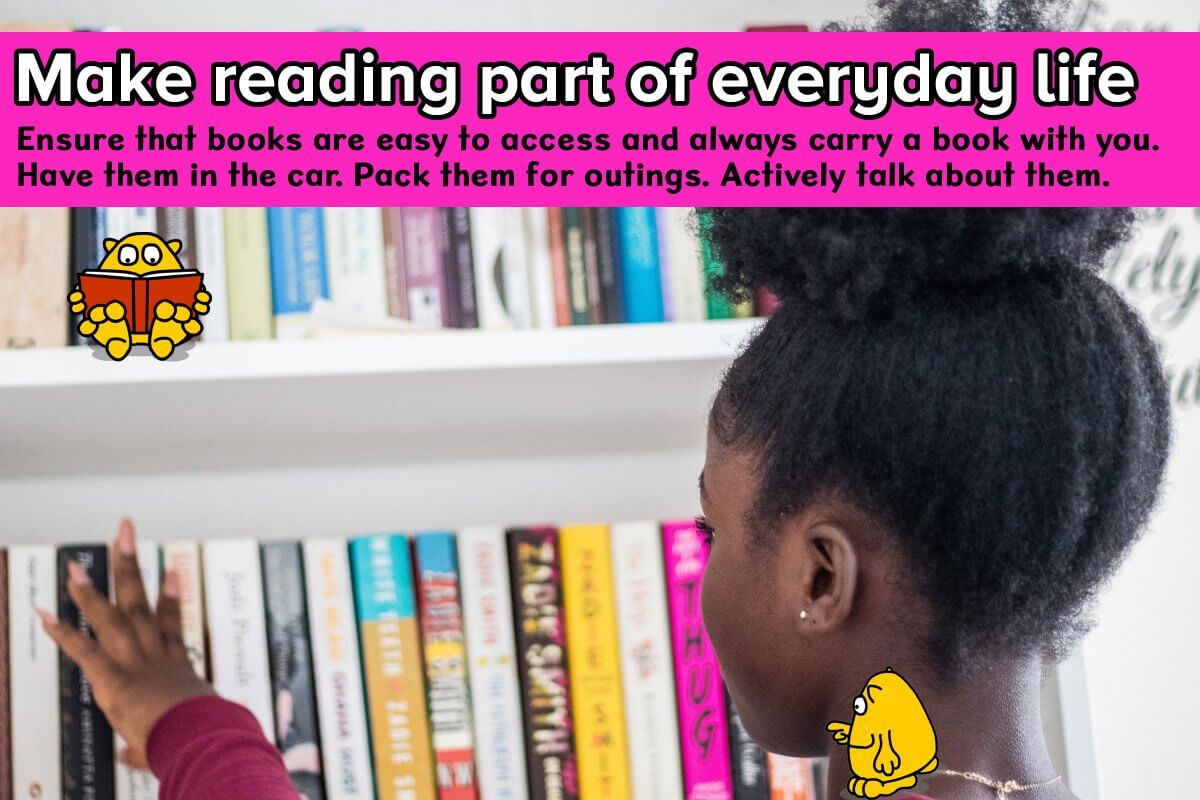
Don’t make reading into a big thing; just make it a big part of everyday life! Build it into your everyday routine. Actively talk about books every day and ask what interesting things they’ve been reading about.
Ensure that books are easy to access and always carry a book with you. Have them in the car. Pack them to go on holiday. Take them out with you to keep them entertained at dinner.
Let children know that reading, and the knowledge and understanding that comes with that, can help them in all parts of life e.g. reading books about starting school, learning something new, a new sibling on the way or any life-changes.
An easy quick-win is to turn on the subtitles on the TV so that children are exposed to words even when they’re in a passive activity. In fact, research has shown this subtitles trick doubles the chances of being a good reader.
Get children involved in reading the recipe for dinner or the instructions for your board game – it’s all experience and adds to their confidence.
9. Do you know how to enjoy reading?
Life is busy! You may well have stopped reading much yourself, perhaps allotted holidays as the time that you finally get around to reading a good book!
Your attempts at encouraging your child to love reading might be a bit thwarted if they don’t see that you love reading too though. Be a reading role model and show them how to enjoy reading – try to find time to enjoy reading in front of them – magazines, the newspaper and recipe books all count! Always have books on display and make them easy to access.
10. Why you should never stop reading to children
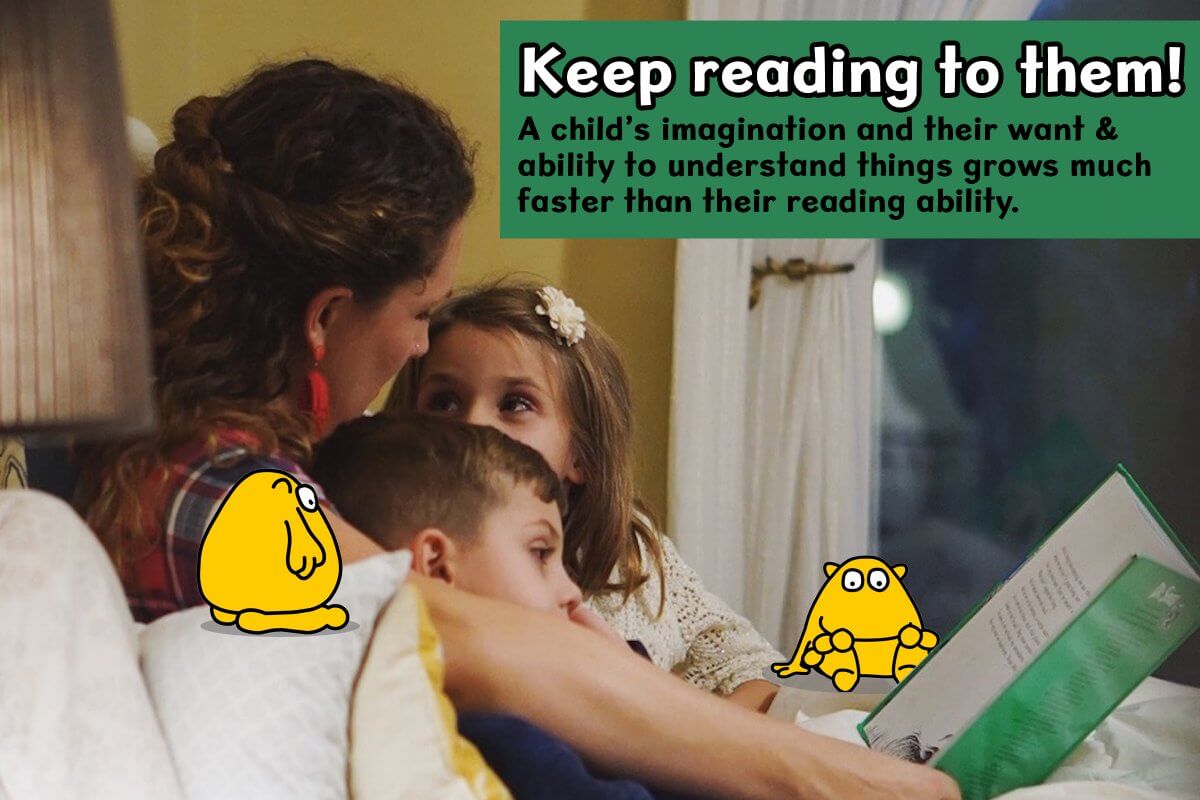
A child’s thirst for knowledge, their imagination and their want to understand things will grow at a much faster rate than their reading ability. You can help to bridge that gap by reading to them.
Reading to children will increase their vocabulary and will also fuel their inspiration and motivation to want to learn to read at a higher level for themselves.
Utilise all the tips in this blog to choose a story of interest, engage them in the story, make it fun and rewarding – you are showing them firsthand how to enjoy reading for pleasure.
Ready to encourage your children to love reading?
In summary, to love something you need to enjoy it! To enjoy something you need to find it interesting, be engaged and to feel confident and supported. We hope we have given you lots of ideas to help you with making reading accessible and enjoyable.
We’d love to know what you think our ideas to encourage children to love reading. Please do let us know in the comments any other suggestions for how to enjoy reading…
Love reading with Busy Things
Busy Things includes 100s of games and activities for ages 3-11 including a large range Fun Phonics Games to Help your Child Learn to Read and a huge collection of popular book extracts and comprehension activities to engage young readers. We invite you to try them all completely free!
2 Replies to “How to Help Children Enjoy Reading? 10 Simple Steps”
Very informative and well explained. Thanks this will help lot of parents specially the first time parents.
Thank you 🙂